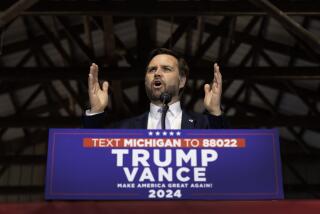Humble Beginnings for Next Leader of Free World
- Share via
UNION TOWNSHIP, Iowa — The process of selecting the next leader of the free world began with 75-year-old Carita Kelleher getting a shampoo and blow-dry at West End Beauty Salon in the tiny town of Winterset.
She was preparing for her television debut on “Good Morning America,” which arrived at her 1,000-acre corn and soybean farm at 4:30 a.m. Monday to get a firsthand look at the way the Heartland nominates candidates for president--the Iowa caucus way.
All across this flat and snowy state, Iowans gathered Monday night at more than 2,100 sites--in churches, firehouses, schools and farmhouses--to declare their support for Republican and Democratic candidates in the first test of the presidential season.
It was an exercise in hand-to-hand politics in which voters stood up and endorsed candidates, not in the obscure privacy of a curtained voting booth, but right there before God and their Iowa neighbors.
This meeting of Democrats started at 7 p.m. sharp, but these are rural people and rural people come early. So at 6 p.m., Kelleher plugged in all the coffeepots. She had been dusting and cleaning for days. Folding chairs dotted her cozy living room.
Twenty-four voters were expected. Twenty-four showed, not to mention reporters for a German magazine and the BBC. This time of year, even the most rural reaches of Iowa land splat in the middle of the political spotlight.
The goal of the caucuses was to select delegates who will go to the state convention weeks down the road. But this also was a giant political popularity contest that all the world was watching. Each caucus was a work in progress. Voters could walk in the door committed to one candidate and leave endorsing another.
“The discussions get spirited, but you are not going to make an enemy,” Kelleher said. “After all, we are all neighbors and Democrats.”
At 8 p.m., after some party business, the caucus divided up: Al Gore supporters in the south end of the living room, Bill Bradley backers in the north. Two married couples split, spouses heading for opposite sides. The wheels of democracy lurched into gear.
A head count: 15 for the vice president, nine for the former New Jersey senator, enough to give Bradley one of the two convention delegates. But if three defected to Gore, Bradley would be declared “unviable” and Gore would get both delegates.
The debate began.
“Any Bradley supporters want to woo any Gore people? This is the time,” precinct committeeman Dan Ryner, a cattleman, urged.
Big silence. No one wanted to speak first.
“I’d like to know what it is about Bradley that you guys like?” Debbie Havel, the caucus secretary, finally asked. “I was mostly turned off by his condescending attitude toward other people.”
Len Flander, a respected attorney, rose to the senator’s defense. “Even though some of his commercials are pretty slick, his concerns for middle-class people have been evidenced since he was elected to the Senate.”
The ice was broken.
“Gore is damaged by the Clinton fiasco . . . , a stained little puppy.”
“He’s not stained. He’s steered clear of that mess.”
“Bradley is a nice guy . . . but he was going to lose his next Senate election. . . . He’s not winnable.”
They chewed over everything from health care to Tipper Gore’s fight for music labels to Bradley’s heart condition. They were passionate but not surly. The discussion lasted about 20 minutes. But no minds would be changed.
“Molly, you sure you don’t want to come over and sit on this side?” a Bradley-supporting husband cajoled his Gore-supporting wife.
“No, thanks!”
That was it, then. After two days of cleaning, two camera crews, two plates of cookies, three pots of coffee, two hours of talk and a drive down a long gravel road in the dark, the candidates split the spoils.
Caucuses like this one, in a hundred-year-old Iowa farmhouse, are dying. Only about 8% are conducted in homes anymore, the rest moving to public buildings that ensure accessibility for the disabled. Even in this tiny township of fewer than 400 people, the Republicans all met at the high school.
Iowa does not necessarily make presidential campaigns, but a poor showing here can surely break them. The results on this night could resonate in New Hampshire. Critics question why a state best known for cornfields and hogs should have such a huge say in who gets to the White House. Iowans worry that their first-in-the-nation spot is in jeopardy.
But unlike other states, where voters spend two minutes marking an X on a ballot, Iowans come out after dinner, sometimes in snow and wind, for a political discourse that can last two hours or more.
“It’s grass-roots democracy. These fellas and their wives are meeting with us directly to get our attention,” Ryner said. “I’ll have to admit, for what you have to do, it can be kind of a pain.”
Still, they agreed, it’s worth it.
“I can tell you the positions of not only the two Democrats running but all the Republicans,” Kelleher said. “And I bet you people who don’t have caucuses or don’t participate can’t do the same.”
The participants got up to get their coats. By 9:20, all were gone. The leaders called in the results.
The BBC reporter left with Kelleher’s recipe for seven-layer bars. The German reporter helped with the coats.
“We are here 200 years after the revolution to see how democracy should work,” the British reporter joked.
They all laughed and nodded. True enough.
More to Read
Get the L.A. Times Politics newsletter
Deeply reported insights into legislation, politics and policy from Sacramento, Washington and beyond. In your inbox twice per week.
You may occasionally receive promotional content from the Los Angeles Times.










